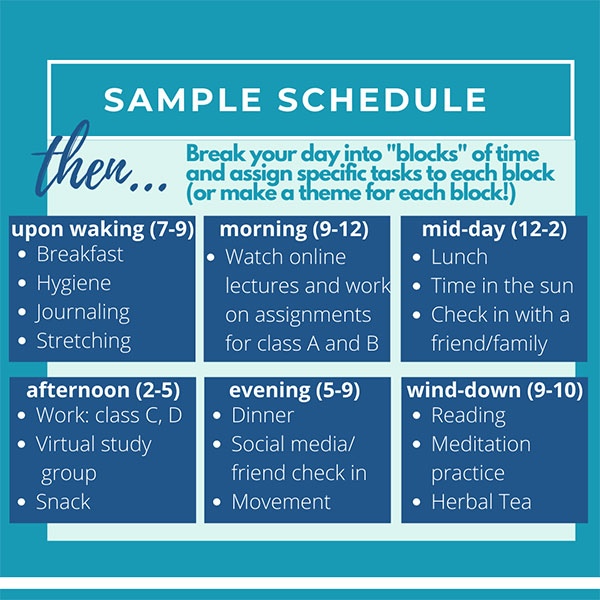#BeWellUGA at Home: Finding a Routine During the Summer
If you’re feeling the impact of a new schedule or lack of structure, it can be helpful to create a routine that includes time for things you have to do and things you want to do. It can take a little time to land on a routine that feels best for your life, but the strategies below can help to find the perfect routine.

Step One: Organize by Areas of Wellness
In order to make sure you don’t miss out on anything, consider organizing all your tasks by domains of wellness. For example, you might use the domains Academics, Social, Nutritional, and Mental. Within each domain, list out everything you can think to include in your daily routines.
This could be:
- completing a reading for Academics
- scheduling time to video chat with friends for Social
- preparing or eating food for Nutritional
- setting aside time to meditate or exercise for Mental
Once everything is written down, it is much easier to get an idea of how much time needs to be dedicated to each category. Also, consider your typical energy levels during the day and when you prefer to do different things (i.e. resting versus doing exercise).
Step Two: Calendar Blocking
Once you have your tasks organized by wellness domain, consider using the strategy of calendar blocking to create your daily schedule. Calendar blocking involves breaking up your day into time blocks and then including multiple tasks in each block. We’ve included an example for you below that breaks the day into times. You can also block the day into “themes” such as School Work, Rest, Health, etc.

Pick blocks of time that feel natural for you. Remember, including different types of tasks in each time block can help make sure you are getting things checked off your to do list!
Step Three: Self-Care
It’s important to remember self-care in your daily routine. From daily hygiene, preparing meals ahead of time, or a creative project – these tasks are those that help to support your physical and mental wellness. Activities such as these can help keep stress levels low and naturally create a routine and rhythm for your day.
Self-care looks different for different people – try to make the following lists to identify some self-care that best supports you:
- What passive tasks do I use to rest or calm down? (i.e. watch TV, social media, listen to music)
- What active tasks do I use to rest or calm down? (i.e. journaling, exercising, making art, playing an instrument)
- What “lifestyle” tasks need to be completed to reduce my overall stress? (i.e. Setting up automatic payments for bills, setting reminders on calendars for important dates, creating a master grocery list, creating a cleaning routine)
These three areas all encompass different aspects of self-care, and staying mindful of these can bring ease to your life.
Step Four: Staying Connected
Lastly, finding ways to stay connected can help reduce feelings of loneliness and keep you on track with your daily routine. Consider having a set time each day to call or video chat with a friend or family member. This will ensure that there’s time every day to talk with someone and can serve as a reminder to keep up with your routine. Maybe you can even find a buddy to commit to a new routine and help hold each other accountable!
As always, the Health Promotion Department is here to support you with your wellness goals. Stay connected with us on social media and with the BeWellUGA At Home webpage – we’ve got lots of great content on the way to stay well during the Summer.
Written by: Michael Money, Case Manager, The Fontaine Center / UHC Health Promotion
